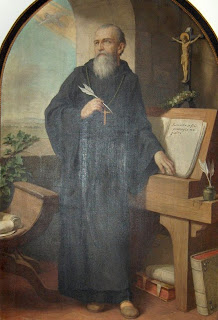Early Life: Augustine was born on November 13, 354, in Thagaste (present-day Souk Ahras, Algeria), in the Roman province of Numidia. His mother, Saint Monica, was a devout Christian, while his father, Patricius, was a pagan who converted to Christianity on his deathbed.
Education and Early Career: Augustine received a classical education and was initially influenced by Manichaeism and later by Neo-Platonism. He was a rhetorician in Carthage, Rome, and Milan.
Conversion and Christian Life: Augustine's spiritual journey and conversion to Christianity were profoundly influenced by the prayers of his mother, Monica, and the preaching of Saint Ambrose, the Bishop of Milan. His conversion is famously chronicled in his autobiographical work "Confessions," where he details his struggles with moral questions and his quest for truth. He was baptized in 387.
Bishop of Hippo: After his conversion, Augustine returned to North Africa and was ordained a priest in 391 and became a bishop in 395 in Hippo Regius (now Annaba, Algeria). He was a prolific writer, with his most notable works being "Confessions" and "The City of God."
Theology and Philosophy: Augustine's contributions to theology include his teachings on original sin, divine grace, and predestination. He also contributed significantly to the development of just war theory and Christian philosophy.
Death: Augustine died on August 28, 430, in Hippo, during the siege of the city by the Vandals.
After the death of his mother St. Monica, Augustine remained several months in Rome, chiefly engaged in refuting Manichæism. He sailed for Africa and after a short sojourn in Carthage, returned to his native Tagaste in 388.
Upon arriving, he sold his father’s estate as well as all his possessions and gave the proceeds to the poor. Then, with his friend, Alypius, he carried out his idea of living a life in poverty, devoting themselves to reading the Scriptures and intensive prayer. It was also during this time that Augustine wrote his first philosophical treatises. This sabbatical, however, lasted only 3 years for one day as he entered the basilica, the churchgoer upon recognizing him as the famous rhetorician, suddenly gathered around him, cheered him, and begged Bishop Valerius to raise him to the priesthood. Augustine did not think of entering the priesthood but eventually was obliged to yield to their appeal, and was ordained in 391.
The two friends were ordained priests at Hippo. Alypius became the bishop of Tagaste; serving in that capacity for thirty years. Before long, Bishop Valerius made Augustine coadjutor and then bishop of Hippo in 396. Augustine remained in that post for almost 40 years until his death.
Right in the first paragraph, on his famous Confessions, there is a sentence "You have made us for yourself, Oh God, and our hearts are restless until they rest in you."
Augustine saw that the human heart is created with a great abyss that only God can fill. The earthly satisfactions that we can throw to fill this abyss are but a handful of stones that is not even enough to cover the bottom.
Patronage:
Saint Augustine is the patron saint of brewers, printers, theologians, and a number of cities and dioceses.
Prayer to St. Augustine:
"O Holy Saint Augustine, who has famously declared that 'Our heart is restless until it rests in You,' help us to seek God's will in all things and to find peace in His grace. Inspire us with your love for truth and your journey from sin to sanctification. Guide us to live in faith and virtue, turning away from worldly distractions. May we follow your example in seeking deeper understanding and love for God. Through your intercession, may we grow in wisdom, charity, and humility. Amen."
Reflection:
*Reflecting on Saint Augustine's life encourages us to consider our own spiritual journey. His transformation from a life of worldly pleasures to one of profound spiritual depth reminds us that it's never too late to turn towards God. His intellectual quest for truth and understanding serves as an inspiration for all who seek deeper meaning in life and faith. His teachings on grace, divine love, and the human condition continue to resonate, offering insights into how we can live a life oriented towards God and our community.
*The one practical thing we can do really is to do the will of God. It can be the most difficult thing we can do but in the end you will realize that the best thing you’ve really done in your life is following God.
*In St. Augustine, we read a great deal about human weakness and how much we need every day to be converted. At the same time, you see God’s grace, His ineffable love, compassion, mercy and infinite goodness. He longs to embrace us... and if we only let Him he can take hold of our lives and change it.
*The one practical thing we can do really is to do the will of God. It can be the most difficult thing we can do but in the end you will realize that the best thing you’ve really done in your life is following God.
*In St. Augustine, we read a great deal about human weakness and how much we need every day to be converted. At the same time, you see God’s grace, His ineffable love, compassion, mercy and infinite goodness. He longs to embrace us... and if we only let Him he can take hold of our lives and change it.






